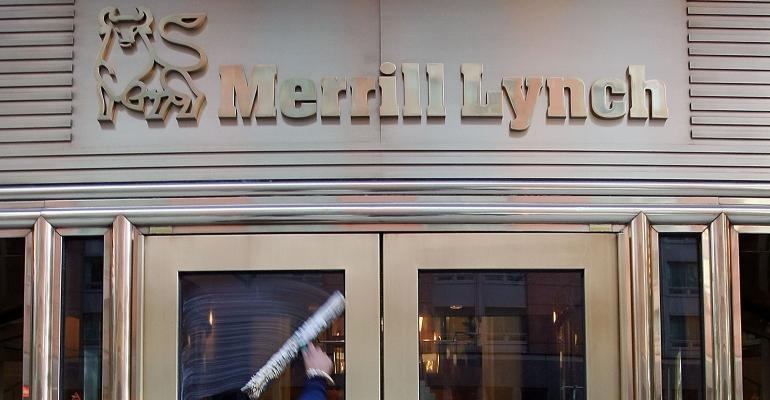(Bloomberg) -- Daniel Tully, a former Merrill Lynch & Co. chairman and chief executive officer who spoke out as both critic and cheerleader as the firm tried to weather the 2008 mortgage crisis, has died. He was 84.
He died May 10 , according to Susan McCabe, a spokeswoman at Bank of America Corp., which bought Merrill Lynch in 2008.
Merrill Lynch shares tripled during Tully’s tenure as CEO, from May 1991 to December 1996. Assets under management topped $500 billion for the first time in 1993; that year, Tully earned $9.6 million in salary and bonuses.
After retiring as chairman in 1997 after 42 years at the firm, he watched as Merrill’s fortunes continued their bull-market rise, then fell with dire consequences.
In 2007, he became the first former head of the New York-based firm to speak out about its performance under CEO Stanley O’Neal. That year’s third-quarter net loss of $2.24 billion, the biggest quarterly loss in Merrill’s 93-year history, was primarily the result of $8.4 billion in write-downs on loans and mortgage-backed bonds.
’It’s Awful’
“I’ve been in touch with many, many of our fellow employees and ex-employees and they’re sick, everyone is sick about it, as I am too,” Tully said in an interview at the time. “It’s awful.” He lamented “the excessive risk that apparently was taken.”
In August 2008, Tully praised O’Neal’s successor, John Thain, for liquidating $31 billion of mortgage securities for 22 cents on the dollar.
“It’s good to have it behind us and not play the market with the so-called dynamite,” Tully said then. “The organization will go back to the basics, and we will once again be very profitable.”
One month later, Charlotte, North Carolina-based Bank of America announced its takeover of Merrill Lynch, which became the bank’s wealth-management division.
Along with John L. Steffens, a former Merrill Lynch vice chairman, and Winthrop Smith Jr., a former head of Merrill’s international brokerage whose father was a firm co-founder, Tully wrote a column in April 2009 for the Charlotte Observer newspaper taking an optimistic view of Merrill Lynch’s future as part of Bank of America.
Merger Optimism
“Two great leaders are poised to become a powerhouse, the number one financial franchise in the world,” the Merrill Lynch veterans wrote. “So, let the critics carp. We will survive stronger and better positioned to profit globally. We are bullish on this merger.”
Daniel Patrick Tully was born Jan. 2, 1932, and grew up in Jackson Heights, in the New York City borough of Queens. An early job was as copy boy for the New York Daily News.
“When I was growing up, everyone in my family was a steam fitter, which was a blue-collar, union job,” he wrote in a contribution for “My One Big Break,” a 2004 book. “So my parents were shocked when I said I wanted to attend college instead of continuing that tradition.”
Early Career
Tully earned a degree in accounting from St. John’s University in Queens. After serving in the U.S. Army, he landed a job in 1955 as a junior accountant at the partnership then called Merrill Lynch, Pierce, Fenner & Beane.
“I didn’t know what the company did, and neither did anybody in my family,” he said.
His path up the corporate ladder included a seven-year stint in the firm’s Stamford, Connecticut, office. Tully was named a vice president in 1971, president of consumer marketing in 1984, president and chief operating officer in 1985. He was deputy to CEO William Schreyer and succeeded him in May 1992, adding the chairman’s role the following year.
Tully told CNN’s Lou Dobbs in 1997 that Merrill had found success by focusing on long-term client relationships.
“If you follow your clients, you’ll continue to do well because you won’t be narrow, you won’t be myopic,” he said.
Five Principles
He insisted that Merrill Lynch offices around the globe display the five principles -- client focus, respect for the individual, teamwork, responsible citizenship and integrity -- on which Charlie Merrill had founded the firm, Greg Farrell wrote in “Crash of the Titans,” his 2010 book about Merrill’s collapse.
Tully “could make clients feel like they were Merrill Lynch’s most important customers,” Farrell wrote. “On road trips, he would follow up client meetings with visits to the local offices of Merrill Lynch private client managers, where his glad-handing and banter weren’t an act, but the expression of a man who actually cared about the firm’s network of financial advisers.”
Merrill’s work with one of its clients -- Orange County, California -- left a blot on Tully’s record. The firm sold the county customized bonds that initially generated high returns but led, in December 1994, to the biggest municipal bankruptcy in U.S. history. The county sued Merrill, which settled for $400 million in 1998.
Tully was named non-executive chairman of the National Association of Securities Dealers in 1996.
He had four children with his wife, Grace.
To contact the reporter on this story: Laurence Arnold in Washington at [email protected] To contact the editors responsible for this story: Charles W. Stevens at [email protected] Steven Gittelson

